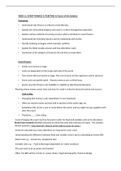Lecture notes
Event finance and ticketing
- Module
- Event management
- Institution
- The University Of Salford (USAL)
Outcomes: Understand why finance is critical to event lifecyles. Explain why forecasting budgets and costs is a critical management operation. Explore various methods of earning revenue which contribute to event finance. Understand the Ticketing industry and its relationship with events...
[Show more]



